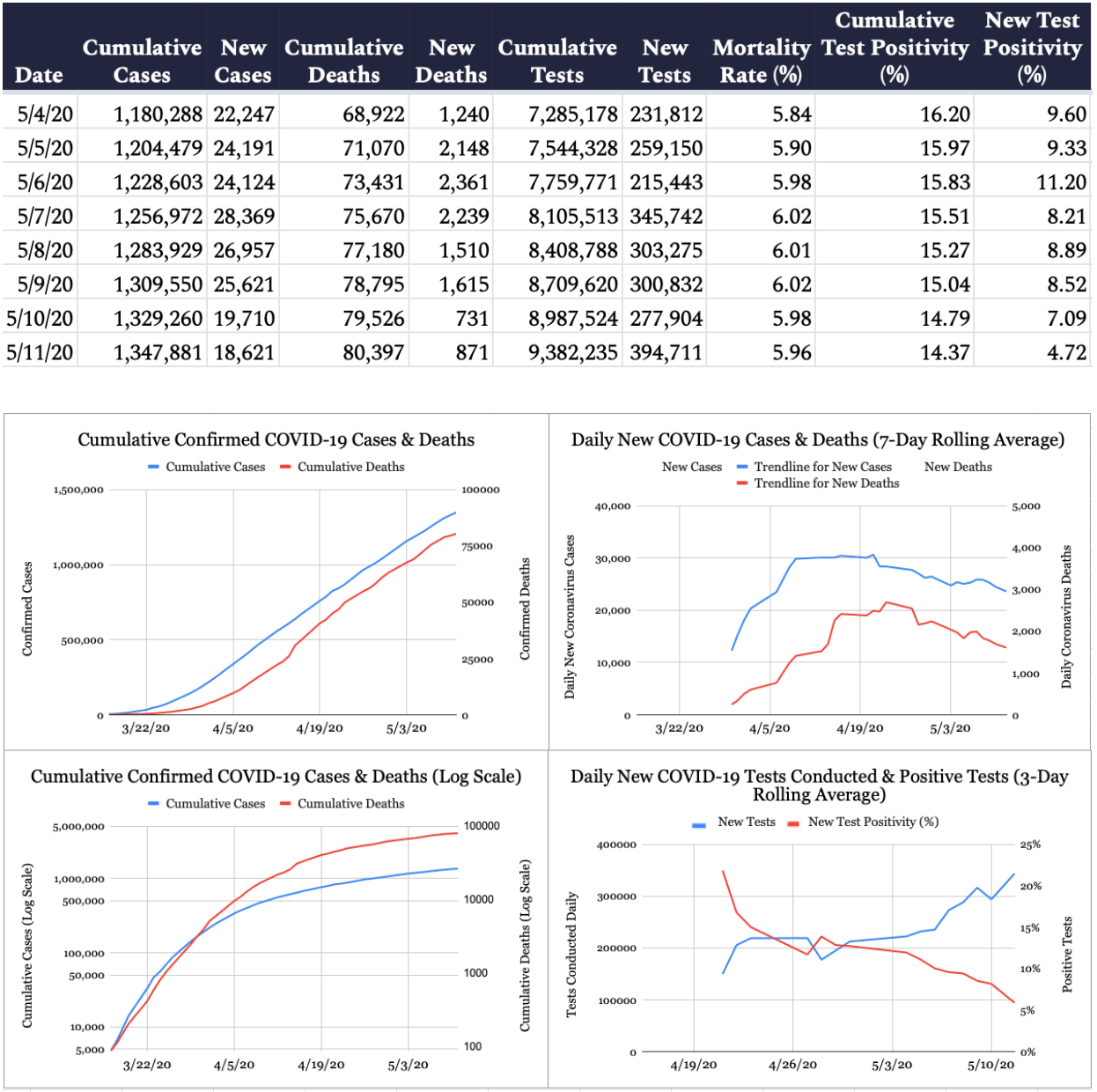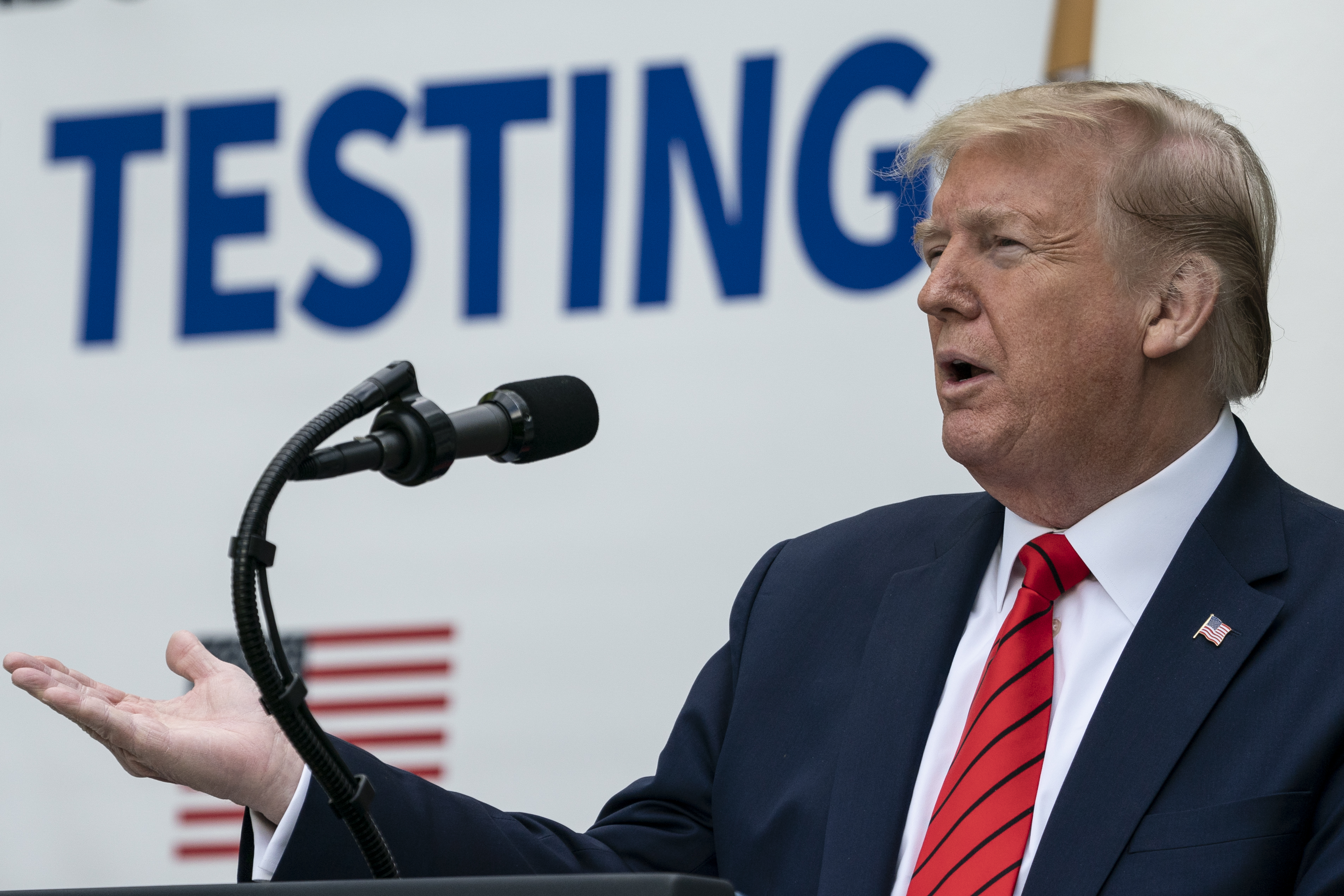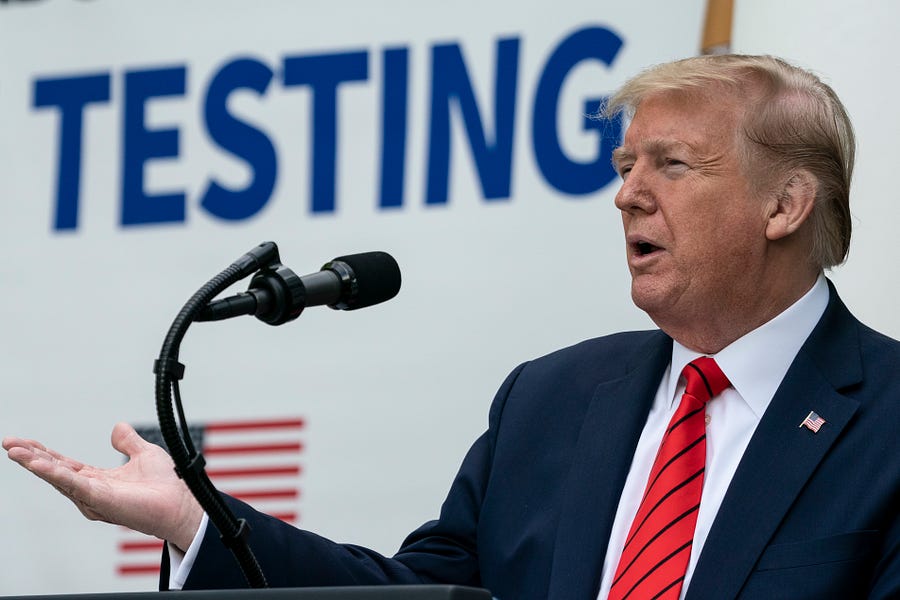Happy Tuesday! Declan was sentenced to five minutes in the penalty box for neglecting to include the National Hockey League in yesterday’s sports roundup. He sends along his apologies.
(The NHL season has been on pause since March 12, but the league is hoping to resume play in four “hub cities” without fans at some point over the summer.)
Quick Hits: Today’s Top Stories
-
As of Monday night, there are now 1,347,881 confirmed cases of COVID-19 in the United States (an increase of 18,621/1.4 percent from yesterday) and 80,397 deaths (an increase of 871/1.1 percent from yesterday), according to the Johns Hopkins University COVID-19 Dashboard, leading to a mortality rate among confirmed cases of 6 percent (the true mortality rate is likely lower, but it’s impossible to determine precisely due to incomplete testing regimens). Of 9,382,235 coronavirus tests conducted in the United States (394,711 conducted since yesterday), 14.4 percent have come back positive.

-
In an email to New York Times reporter Sheryl Stolberg, Dr. Anthony Fauci previewed the message he’ll convey today in testimony before the Senate’s Health, Education, Labor and Pensions Committee. Fauci warned of “the danger of trying to open the country prematurely,” insisting: “If we skip over the checkpoints in the guidelines to: ‘Open America Again,’ then we risk the danger of multiple outbreaks throughout the country. This will not only result in needless suffering and death, but would actually set us back on our quest to return to normal.”
-
After President Trump spent much of Mother’s Day weekend tweeting promises to investigate President Obama over the origins of the Michael Flynn probe, Senate Republicans spent Monday dancing around the question. “I’m not anticipating calling President Obama,” Judiciary Chairman Lindsey Graham said.
-
President Trump’s fundraising operation narrowly out raised Joe Biden’s last month, with the Trump campaign and RNC pulling in $61.7 million compared to Biden and the DNC’s $60.5 million.
‘We Have Met the Moment and We Have Prevailed’

President Trump returned to the Rose Garden yesterday to announce new plans on testing and take questions from the White House press corps in a format that felt reminiscent of the last coronavirus task force briefing on April 27.
In his remarks, the president announced that the United States was now performing 300,000 tests per day and will have conducted 10 million tests by the end of the week, surpassing the per capita testing in countries like Japan, France, and Finland. At least 10 countries, however, are still outperforming the United States, including Italy, Russia, and Britain.
Researchers at the Harvard Global Health Institute issued a report over the weekend that estimated the United States would need to perform between 500,000-700,000 tests per day as states ease social distancing measures in favor of “testing, tracing, and isolating all individuals presenting coronavirus symptoms.”
The administration also announced that it would be distributing $11 billion from the CARES Act to assist in ramping up testing capabilities for every state, asking states to test at least 2 percent of their populations in May, which will require just under 13 million tests.
He also highlighted his new catchphrase, saying “we will defeat this horrible enemy, we will revive our economy, and we will transition into greatness … that is a phrase you will hear a lot because that is what is going to happen.” Despite the death toll surpassing 80,000, he also said that “we have met the moment and we have prevailed.” Asked about the comment later, he clarified that he was referring to the country’s “great testing capacity.”
Adm. Brett Giroir, the assistant secretary for health, was more specific, noting that at 3 million tests a week, “Everybody who needs a test can get a test … we have plenty of tests for them.”
After two staff members in close proximity to the president and vice president tested positive last week, the White House has increased testing for White House staff and mandated that all staff wear protective masks at all times except when they are at their desks. Asked by ABC’s Jonathan Karl why “Americans who are going back to work should not expect, should not need, should not want to have the same thing that people coming to work in the White House have, which is the ability to get tested regularly,” Giroir noted that only people coming into close contact with the president were getting tested on a regular basis, which he referred to as a “very specific circumstance.”
COVID-19: Not Just For Your Lungs Anymore
By now, most of us have the slogan drilled into our brains that the novel coronavirus is not a flu, but rather something far stranger and deadlier. But we still mainly think of the germ as flu-adjacent—a respiratory bug accompanied by fever and coughing, which kills, when it kills, by clogging the lungs with fluid and suffocating its victims of oxygen.
A growing number of doctors are becoming convinced it’s not so simple. Instead, they’re seeing patients whose COVID-created pneumonia is brought under control—only for a slew of other systems in the body to begin to go haywire. “What this virus does is it starts as a viral infection and becomes a more global disturbance to the immune system and blood vessels—and what kills is exactly that,” Dr. Mandeep Mehra of Harvard University’s medical school recently told the Seattle Times. “Our hypothesis is that COVID-19 begins as a respiratory virus and kills as a cardiovascular virus.”
Sudden kidney failure. Pulmonary embolism. Loss of the sense of smell or taste. Toxic shock syndrome. Damaged blood vessels. Skin rashes. An immune system run berserk. Stroke. All these maladies and more have been occurring at highly elevated rates—yet distributed seemingly randomly—among patients suffering from serious cases of COVID.
One apparent cause of a number of these maladies: thrombosis, or blood clots. As we’ve discussed previously, the novel virus seemingly has the unusual effect of creating a plethora of minuscule clots, which can end up manifesting in all sorts of unfortunate outcomes depending on whether and where they lodge in small blood vessels.
Why the clots? Scientists are only beginning to ask that question—they, like the rest of us, began with the assumption that COVID-19 was a primarily respiratory problem and directed their research accordingly. But early research has offered a few insights. There’s some evidence to suggest that the virus, in addition to attacking lung cells, also attacks the endothelial cells that line the interior wall of our blood vessels—which, when damaged, become inflamed and kickstart the process of protein creation in the blood that leads to clots. If the virus is attacking these cells throughout the body, that could explain why the blood of some COVID patients displays a bizarre predilection to clot at the slightest provocation, as well as why clot formation is decentralized and frequent—many microscopic clots rather than the one big one that’s frequently responsible for issues like strokes.
Even if clots don’t become a problem, the inflammation itself might. While children are usually among the least likely patients to become seriously ill and die of COVID, a small number have been hospitalized in recent days in New York and the U.K, with cardiac inflammation resembling toxic shock syndrome or Kawasaki disease. It remains unclear whether this was brought on by COVID—not all the children hospitalized tested positive for the disease. But the cases remain a worrisome indicator that not all the virus’s negative effects are yet necessarily known.
Runaway inflammation can also become a problem through a so-called “cytokine storm”—where the body’s own immune system short circuits, attacking healthy tissues as well as diseased ones. This, too, has been found to be a leading cause of death in many patients suffering from COVID-19.
This smorgasbord of symptoms brings home an unfortunate reality: Even once we’re through the current pandemic, many of its survivors may be grappling with its damage for the rest of their lives.
“While most COVID patients don’t need ICU care, a troublingly high number of those who do end up in kidney failure or with profound neurological deficits,” one critical care nurse recently told Talking Points Memo. “Several patients at work have been off all sedation for almost a week, and show no signs of waking up—I doubt that they ever will. And people with kidney failure may need dialysis for life. When the discussion is limited to false binaries of deaths vs. recoveries, these cases get left out of the dialogue.”
Trust in the Age of Coronavirus
For the site today, Declan explored what—once state lockdowns are eased—will prove the biggest remaining impediment to a functional “reopening” of the economy: fear, distrust, and paranoia.
A sneak peek:
The 15-second ad sounds like it’d fit better in a dystopian science fiction movie than the present-day United States.
“At Domino’s, we pride ourselves on handcrafted pizza,” a narrator reads. “But after leaving our 450 degree ovens, the only hands that touch them are yours. … Get them with contactless delivery, from Domino’s.”
The voiceover brims with a cheery aloofness that distinguishes the spot from the scores of somber commercials that have sprung up in recent months. But the subtext is clear: Trust us, you won’t contract coronavirus from eating our pizza.
Everything has changed in the months since COVID-19 has reared its ugly head: 80,000 are dead, nearly 1.5 million are confirmed to be infected, and tens of millions are out of work. Schools, workplaces, and community groups have shifted online; sports seasons, movie premieres, and vacation plans have been put on hold.
But even within our “new normal” of sheltering in place, social distancing, and mask-wearing, something else has been evolving: our relationships with one another.
It happened subtly at first. You might have begun opening doors with your shirt sleeve, or ceased shaking hands. You stopped frequenting your favorite coffee shop, or taking public transportation. Eventually, you caved and bought a mask. Trips to the grocery store have become fewer and farther between, and you find yourself recoiling if you turn the corner into a new aisle and see another shopper heading your way. When the elevator’s brakes kick into gear, you now cringe, knowing someone else is about to join you in your suddenly too-small metal box.
Nine weeks into the Age of COVID-19, we’ve learned more about the virus, how it spreads, and what it does to our bodies. And we’ve evolved into amateur epidemiologists in the process. Date nights have become possible hotspots. Our parents and grandparents are now “high-risk populations.” Where we once saw friends and neighbors, we now see potential vectors.
Worth Your Time
-
We miss sports! We miss them a lot! So do sportswriters Spencer Hall and Jason Kirk, who have given us this great piece for Hazlitt trying to reconstruct what sports were even like. (“I remember there were expensive commercials … all the spreadsheets, piling longer and longer forever … Do you remember how, back when there were sports, each person had a list of teams they strongly preferred to win?”)
-
Over at Commentary, Noah Rothman has a grim assessment of the wildly divergent levels of force with which lockdown enforcement is being dispensed: “We’re past the point at which the enforcement of these lockdowns involved dispatching urban police forces to break up gatherings of 10 people outside a Trader Joe’s. Amid increasing social unrest, the debate over the balance between life and liberty is tipping back toward liberty.” Unjust distribution of force, he argues, is eroding the social consent to lockdown policies that is indispensable to their effective function.
-
We’ve been hearing a lot about how some of the GOP’s “RINOs” (Republicans in Name Only) are considering a vote for Joe Biden this year. This, unsurprisingly, has been met with a certain amount of “good riddance!” harrumphing from many of President Trump’s more ardent supporters. In a Fox News column, Arnon Mishkin, the director of the Fox News election night “decision desk,” suggests those supporters tap the brakes: “The president—and the entire Republican party—run a clear risk in trying to run without the support of many who are not entirely supportive of Trump, especially if Biden is trying to organize them. Indeed, it was the RINOs who arguably put Trump over the top and into the White House in 2016. And while many Trump supporters may not like them, they’re going to need them again in 2020.”
Presented Without Comment
Also Presented Without Comment
Toeing the Company Line
-
The latest Advisory Opinions is out, and David and Sarah were not wanting for content. Oral arguments for Our Lady of Guadalupe School v. Morrissey-Berru, a Title IX overhaul, new details in the shooting death of Ahmaud Arbery, and the now-dropped case against Michael Flynn: They break it all down here.
-
A few days ago, One America News Network reported that “over 90 percent of patients treated with hydroxychloroquine successfully recover from coronavirus.” In his most recent Fact Check, Alec finds the scientific research behind this claim is highly suspect.
-
On the site today, physician Akino Yamashita offers up a primer of the some of the treatments being used on patients with COVID-19, including remdesivir and the much-debated hydroxychloroquine.
-
Some NATO members have long urged the organization to pay attention to the “southern flank,” or Africa and the Middle East. Others still prefer to focus on the “eastern flank,” by which they mean Russia. What happens when Russia seeks influence in Africa and the choice is no longer binary? On the site today, Joseph Hammond looks at some potential ways the group could make inroads in Africa.
Let Us Know
One consequence of the coronavirus’ geographical concentration in a few major hotspots has been that most people either know a bunch of people who have had the virus or none at all. As the first wave of cases begins—hopefully, hopefully, hopefully—to recede, do you personally know anyone who’s fallen seriously ill with the thing?
Reporting by Declan Garvey (@declanpgarvey), Andrew Egger (@EggerDC), Sarah Isgur (@whignewtons), and Steve Hayes (@stephenfhayes).
Photograph by Drew Angerer/Getty Images.





Please note that we at The Dispatch hold ourselves, our work, and our commenters to a higher standard than other places on the internet. We welcome comments that foster genuine debate or discussion—including comments critical of us or our work—but responses that include ad hominem attacks on fellow Dispatch members or are intended to stoke fear and anger may be moderated.
You are currently using a limited time guest pass and do not have access to commenting. Consider subscribing to join the conversation.
With your membership, you only have the ability to comment on The Morning Dispatch articles. Consider upgrading to join the conversation everywhere.